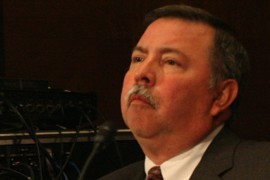Cronkite News has moved to a new home at cronkitenews.azpbs.org. Use this site to search archives from 2011 to May 2015. You can search the new site for current stories.
Express Scripts CEO calls 1,700-worker Tempe site critical to company
WASHINGTON – Express Scripts’ CEO said Tuesday that the company’s 1,700-worker Tempe site is “critical” to the pharmaceutical benefits manager, which is in the midst of a $29.1 billion bid to purchase its biggest rival.
George Paz told a Senate subcommittee that some “back office” positions could be at risk if Express Scripts is allowed to acquire Medco. But when asked after the hearing how much of Express Scripts’ Tempe facility fit the back-office label, he said, “None.”
“That’s not back-office,” Paz said. “That’s call centers (in Tempe). That’s pharmacies. It’s very important to our business.”
The site is “critical” because it handles 10 million military accounts through the Department of Defense’s Tricare program, Paz said. On a disclosure form in September, he estimated the contract to be worth about $9.1 billion in revenue in 2011.
Both Paz and Medco CEO David Snow said it is premature to consider specific job cuts before the Federal Trade Commission decides whether to approve or block the merger.
“In certain areas such as accounting, legal, some of the back-office functions, those areas will diminish over time,” Paz told the Senate Judiciary subcommittee in a hearing on the antitrust implications of combining the companies.
Express Scripts and Medco are pharmaceutical benefits managers, also known as PBMs, intermediaries between drug-makers and health plans for groups such as employers or unions.
The FTC is reviewing the deal because the merged company would serve about a third of the market. Critics of the deal say such a large company would practically eliminate competition among PBMs, and Express Scripts could name its price on drugs.
Small, independent pharmacies might not be able to survive in that climate, said Susan Sutter, who owns a pharmacy in Horicon, Wis. She said the deal would “threaten the very existence of community pharmacies.”
“There is nothing else left to squeeze (out of) us,” said Sutter, who was testifying on behalf of the National Community Pharmacists Association.
Sen. Al Franken, D-Minn., feared the merger would leave a limited supply of PBMs that could handle health plans for large companies.
“I am particularly concerned this merger will leave very few choices for large employers,” he said during the hearing.
Paz and Snow said the merger would be a boon to patients because their companies are made to negotiate the lowest possible prices.
“We make money when plan sponsors and consumers save money,” Paz said.
In 2010, Express Scripts earned $1.2 billion on nearly $45 billion in revenue. Paz called the company’s roughly 3 percent profit margins “grocery-store numbers,” referring to food-sellers’ notoriously low margins.
With those margins, both Paz and Snow noted that reforms under Affordable Care Act make the deal imperative, as each company has strengths that would help the other thrive under new regulations.
Express Scripts’ Tempe facility employs about 1,700 full-time equivalent workers. A University of Missouri-St. Louis economic report in 2010 said the site creates about $8.4 million in state and local tax revenue for the Tempe region.








